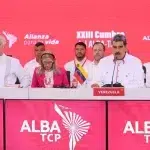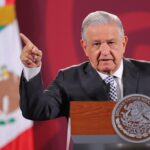
Featured image: From left to right president Nicolás Maduro (Venezuela), Chan Santokhi (Surinam), Irfaan Ali (Guyana), Gustavo Petro (Colombia), Luis Arce (Bolivia), and Luiz Inácio Lula da Silva (Brazil) at the Summit of Presidents in Brazil, on May 30, 2023. Photo: Evaristo Sa/AFP.




